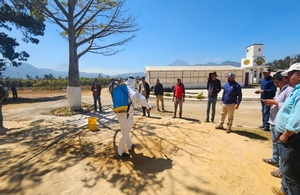UK supports the strengthening of innovative and technologic practices in agriculture
The British Embassy made an alliance with Zamorano Pan-American Agricultural School of Honduras to share agricultural experiences in Guatemala.

The UK partnered with Zamorano, the Guatemalan Institute of Agricultural Science and Technology (ICTA), the International Potato Centre (CIP) and the Current and Emerging Threats to Crops Innovation Lab in Honduras (CETC-IL) led by Pennsylvania State University and financed by Feed the Future - USAID, to understand the management of potato late blight for use in farmer field schools.
The workshops were jointly organised by Zamorano and ICTA, with experts from CIP, and were delivered in Chimaltenango and Quetzaltenango to upskill and research potato late blight management with technicians and producers, understand potato production in Guatemala, and coordinate activities for the establishment of experimental plots.
The British Government has prioritised the development of best practices in agriculture, specifically the use of technology in agriculture (Agri-Tech). The challenge for farmers in the UK and across the world is to produce increasing quantities of nutritious and healthy food, while at the same time making significant environmental gains including improving soils, saving water, and reducing carbon emissions. New developments in science and technology from robotics to sensors to big data are rapidly changing the way farmers work and making it easier to apply innovative practices.
Agri-tech is a diverse sector; it ranges from any technological or scientific innovation or practice used to improve the productivity or sustainability of agriculture, horticulture, aquaculture and forestry. It includes on-site storage and processing of food and non-food products; animal health and welfare of livestock, fish, horses and companion animals.
Given the experience of the United Kingdom and being agriculture a fundamental pilar for the economies of Guatemala and Honduras, partnering with local, regional and international organizations is of great value to share best practices for the positive impact it has in agriculture; practices that will enable producers to face climate change effects, lack of water resources, pests and others.
The workshops benefited more than 60 participants which included technicians and producers from ICTA, Guatemalan Ministry of Agriculture (MAGA), Pastoral Social Caritas, technicians from Asociación de Cooperación para el Desarrollo Social de Occidente (CDRO) and students from Universidad San Carlos de Guatemala.
The British Ambassador to Guatemala and Honduras, Nick Whittingham, said:
We know that late blight in potato is a challenge not only in the UK but globally. Applying practices that enable its control will be vital for crops. We are confident that innovative technologies and practices are a bridge for farmers to achieve better results in less time and to optimize resources.